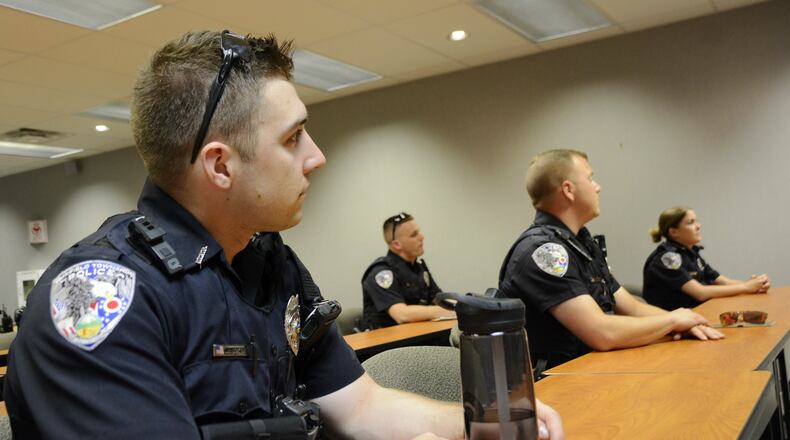While Valandingham said it’s “a very good mix” of young and old police officers, it shows hiring is cyclical. And he said fewer people applying to be police officers.
FAIRFIELD NEWS: Fairfield mayor: City wants to have ‘a seat at the table’ in national opioid lawsuit
“I think most departments would say this, or confirm this, there are fewer people taking tests now than there were before,” he said. “I don’t know if it’s a generational thing, or maybe law enforcement isn’t as appealing as it was.”
There were about 701,000 full-time sworn police officers nationwide as of 2016, roughly a 23,000-officer decline from 2013, according to the Bureau of Justice Statistics. The drop came after 16 years of steady growth in policing.
Valandingham said the number of people taking the National Testing Network police officer test is down, and thus the Fairfield department is getting fewer candidates. It could be due the negative media coverage that law enforcement has received in the past several years, but Valandingham said it could be the younger generation is just interested in something else.
“They aren’t necessarily shying away from policing because of negative connotations,” he said. “I just think they’re maybe more interested in more technical types of jobs. So the numbers aren’t what they used to be in terms of people taking the test. However, in the last few years, the quality of people that (we) have hired has gone up quite a bit.”
While Fairfield has transitioned from administering its own test to the National Testing Network, the Middletown Division of Police still administers its test. And Police Chief Rodney Muterspaw said they “recruit harder than we ever had” and it is getting “harder and harder” to recruit.
“It’s getting younger; it’s a different type of generation,” Muterspaw said. “There are some really good young ones coming up that we really like, but man our department’s the same way (as Fairfield). I have three majors, all that could walk out the door tomorrow and retire if they wanted to.”
MIDDLETOWN NEWS: Middletown schools 1 of 3 districts nationally to win tech award
But Muterspaw said his department’s problem isn’t a lack of the number of candidates. Its most recent test produced 60 applicants, but only four made it through the process, which includes a panel interview, background check and polygraph, and formal interview.
Not being able to pass the polygraph or go beyond the panel interviews “is a problem,” he said.
The four candidates that made it through the process will be hired, Muterspaw said, because they are quality candidates — and all are in their 20s.
“It’s crazy because people just can’t pass the polygraph,” he said. “They’re not being truthful, or (say) things we can’t ignore or turn our heads away. We can’t lower our standards.”
Muterspaw said what’s also likely a cause in the decline the number of quality applicants is social media.
“Social media is a great thing, but it’s also killed applicants because they’re like, ‘Man, I don’t want to see my face plastered all over Facebook or Twitter or Instagram if I mess up.’ And that scares people, and recruits have told us that,” he said.
Fairfield Twp. hired nine new officers since March 2018, all in their late 20s or younger. Those new hires make up nearly half of the township department’s authorized strength of 21, said Capt. Doug Lanier.
And having a younger police force is not necessarily bad, he said.
“We’re just looking for good officers,” Lanier said. “We’re looking for the best person that will make the best employee, regardless of their age.”
HAMILTON NEWS: How you can celebrate Hamilton’s 3 newest murals that decorate the city
But what’s difficult for departments right now is retention, Lanier said.
“Some people, they get into law enforcement and they realize it’s not for them and they get out,” he said. “A lot of people transfer departments, whether it’s for family, better pay, better benefits.”
Lanier said they also leave departments because they want a different work environment, either busier or less busy department, or an urban or rural department.
“It really depends on the individual of what they’re looking for,” he said.
As younger officers have been hired on, policing has also evolved.
“We look to hire people who have a service-orientation mindset,” Valandingham said. “We don’t view ourselves as a traditional law enforcement agency in that we don’t arrest our way out of every problem — we expect our officers to be problem-solvers.”
Hamilton police officer Jim Beeler, who retired on July 4, said he tells younger officers to “kill people with kindness.”
“The nicer you are to people, the more respectful and nicer they are back, and incidents don’t escalate,” he said. “Bad things are easier, and really bad things aren’t as bad if you show people a little bit of kindness.”
Lanier said while it is “challenging to find good, quality employees” departments are still “accountable to the community.”
“There are multiple areas of what police officers are supposed to do, as far as engagement with the community and everything else,” he said.
Fewer police officers
There are fewer full-time sworn law enforcement officers now nationwide after 16 years of growth:
1997: 648,688
2000: 656,645
2003: 683,599
2007: 700,259
2013: 724,690
2016: 701,169
Source: Bureau of Justice Statistics; U.S. Department of Justice
About the Author

